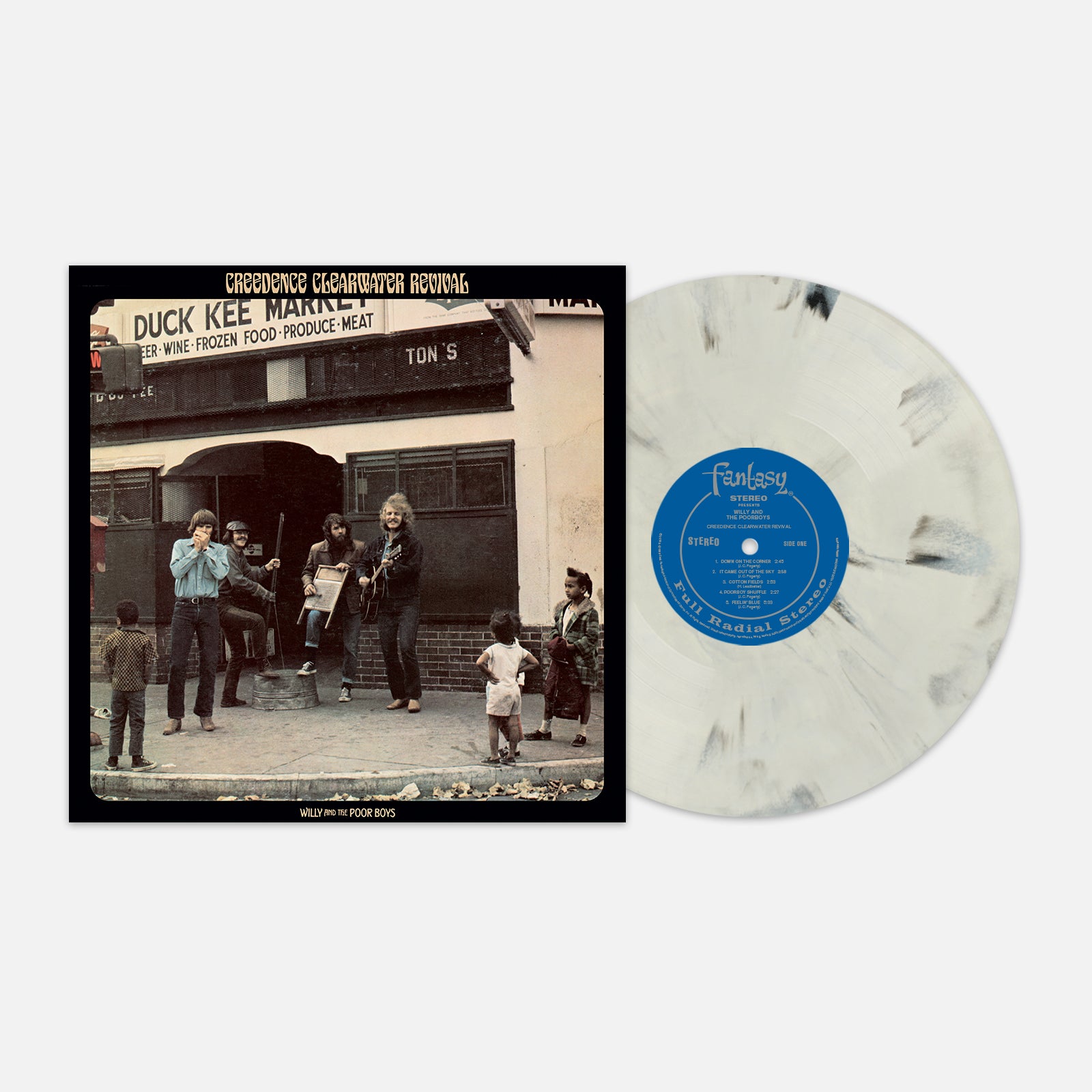嚴格來說,Willy And The Poor Boys 並不需要存在。它的到來並不需要這麼快,於1969年10月發布,僅僅在Creedence Clearwater Revival之前的專輯Green River發行三個月後。而Bayou Country,收錄了讓Creedence獲得全國聲譽的歌曲“Proud Mary”,也僅在當年一月發行。對於來自灣區的這支南方音調四重唱來說,這是一個神奇的突破之年,他們在春季和夏季期間在每個主要的音樂節和電視舞台上表演,而一連串雙A面單曲也一路攀升榜單。他們在八月時已經征服了世界;為什麼要在萬聖節之前急著推出第三張專輯呢?
簡單的回答和每個與 Creedence 相關的問題一樣:約翰·福戈提的自我意識。他不僅僅是創作和演唱熱門歌曲,他對每張專輯的每一首歌曲都是如此,更不用說演奏每個吉他獨奏、演唱每個和聲以及製作每次錄音會議。為了好衡量,他還是他們的商業經理和巡演預約者。這些都是福戈提的選擇。這些政策中的某些讓他的樂隊夥伴感到膈應,但他們仍然接受了這一切,遵循嚴格的練習計劃,精心簡縮的歌曲編排,甚至還有嚴格的演奏時不喝酒協議。當約翰·福戈提手握他童年音樂明星的夢想時,他不會為任何事情放棄它。他會在擁有它的每一刻保持對公眾想像的控制,監督樂隊存在的每一個元素。
然而,事情的更深真相是,Creedence(整個團體,而不僅僅是他們偉大的領袖)在創作上發揮了前所未有的潛力,這在流行音樂歷史上是少見的。他們在 1969 年創作了技術、熱情和跨文化探索不凡的音樂,與那一年其他兩個有遠見的團體 — The Band 和 Sly & The Family Stone 平起平坐。“綠河”、“驕傲的瑪莉”、“生於沼澤”、 “走私”、“羅迪”和他們其他的魅力旋律,為“沼澤搖滾”設定了新範式。這種電台主播的說法通常會立即將樂隊放入時間膠囊,但 55 年後,Creedence 仍然聽起來格外現代。而Willy And The Poor Boys,在那裡你可能預期感受到他們的放慢或靈感枯竭,卻是不可否認的傑作。
它始於“街角”,這是他們最令人愉悅的歌曲之一。福戈提狀態良好,唱著他們的標題雙胞胎,一支鄉村的《披頭四孤獨之心俱樂部》。樂隊具有快樂的流行福音風格,而福戈提的夸張口音聽起來更為親切。就這點而言,他在“它從天而降”這首冷戰滑稽劇中的表現更是有趣,講述的是一顆墮落到地球的衛星。這是對 Creedence 整體風格的完美總結;音樂是純純的查克·貝瑞,但這首歌在前瞻性上微妙,包含了對羅納德·里根的首次歌詞提及,而他在 1980 年代將成為朋克樂隊受歡迎的主題。恰如其分地,當時擔任加利福尼亞州州長的福戈提對“共產主義陰謀”的可能性感到著迷。
這兩首開場歌曲已經展示了樂隊擴展了他們音樂與態度的基本元素,涵蓋了教堂合唱和社會諷刺。音樂本身也比他們早期專輯更為明亮和寬鬆;數十場演出和數百小時的練習將賦予樂隊如此的自信,而福戈提已經成為錄音室的真正藝術家。即使專輯封面展示我們的英雄們以“街角”的搞笑圓盤樂隊姿態出現,Willy And The Poor Boys 的其餘部分卻是一段廣闊的情感旅程,從一首充滿活力的鄉村搖滾翻唱《Leadbelly》的“棉花田”到單弦獨白的藍調“感到憂鬱”,聽起來就像詹姆斯·布朗早晨掙扎起床的樣子。
而在專輯的第二面,福戈提以迥然不同的風格呈現了他最直接的三首社會評論。首先是“幸運之子”,他的永恆憤怒的藍調搖滾,現在基本上成為了“越南”的簡寫。“別再看”的跟進則是向日落唱片的致敬,伴隨著一個鄉村拍子和抨擊青年運動無所作為的歌詞 — 這可不是對大型明星的迎合素材。專輯以福戈提的招牌噩夢之一閉幕。(“壞月亮駛來”出現在綠河;“漫遊”和“穿越叢林”在Cosmo’s Factory尚未推出。)“象徵”是福戈提公認的尼克森之歌,甚至提到了“沉默的大多數”。它描述了一場王的草坪上的火災,蔓延到整個王國並殺死了所有人。這與專輯開頭的“帶一角,踩你的腳”截然不同。
無論這群人怎麼努力,將自己榨乾到粉碎,他們在創作上並未遭受損失。約翰的歌手哥哥湯姆·福戈提和曾經的音樂導師,對他作為純節奏吉他手的乏味角色已經感到不安;在錄製了另外兩張專輯後,他會在 18 個月內退出樂隊。但Willy And The Poor Boys 感覺就像是由一支可以做任何事的樂隊創作的。任何音色,從有趣到憤怒。任何音樂構思:硬搖滾、深藍調或是鄉村音。 “感到憂鬱”和“棉花田”是卓越例證,表明這支看似僅在創作熱門歌曲的樂隊擁有豐富的深度曲目。但對於像“街角”或尤其是“幸運之子”(一首前 20 名的歌曲,但並不算他們的最大熱門)這樣豐富的熱門歌曲,不必道歉。此時這些都是標準歌曲,當它們出現在電影、廣告、棒球賽或燒烤中時,瞬間讓人感到熟悉。但沒人換台;誰不喜歡 Creedence 的出現呢?
這支樂隊的輝煌在於,無論你聽“幸運之子”多少次,它仍然聽起來充滿憤怒。它仍然聽起來音效完美。你聽到其他樂隊的吉他手演奏那段旋律時,它聽起來不對,就像你永遠無法模仿道格·克利福德的鼓、斯圖·庫克的貝斯和湯姆·福戈提的吉他那精確的平衡和堅定。“幸運之子”的題材既關於階級,也關於戰爭,Creedence Clearwater Revival 中艱苦工作的成員,除了庫克,都是在經濟拮据的家庭長大的,他們知道他們所傳達的消息。這支樂隊的一切都是有意義的,即使天真與壓力偶爾使他們的決定自我挫敗。短暫的時間裡,一支如此熱情的團體,外表不張揚,甚至抵制情歌,竟然可以成為世界上最大的樂隊。
約翰·林根是家鄉:一個南方小鎮、一個鄉村傳奇,和最後的山巔酒吧的日子,還有為所有人的一首歌:克里登斯·克里爾瓦特復興樂隊的故事這本書的作者,該書於2022年8月由哈切特出版。他曾為紐約時報雜誌、華盛頓郵報、Pitchfork、牛津美國及其他出版物撰寫文章。

